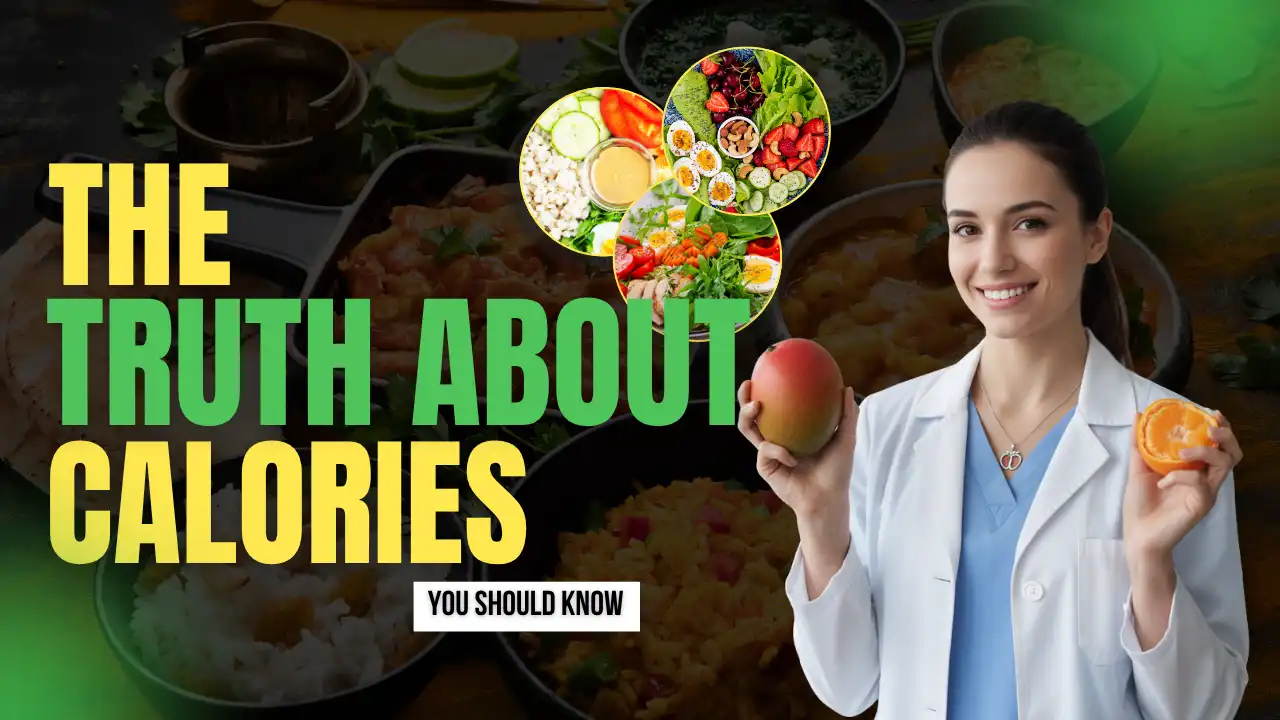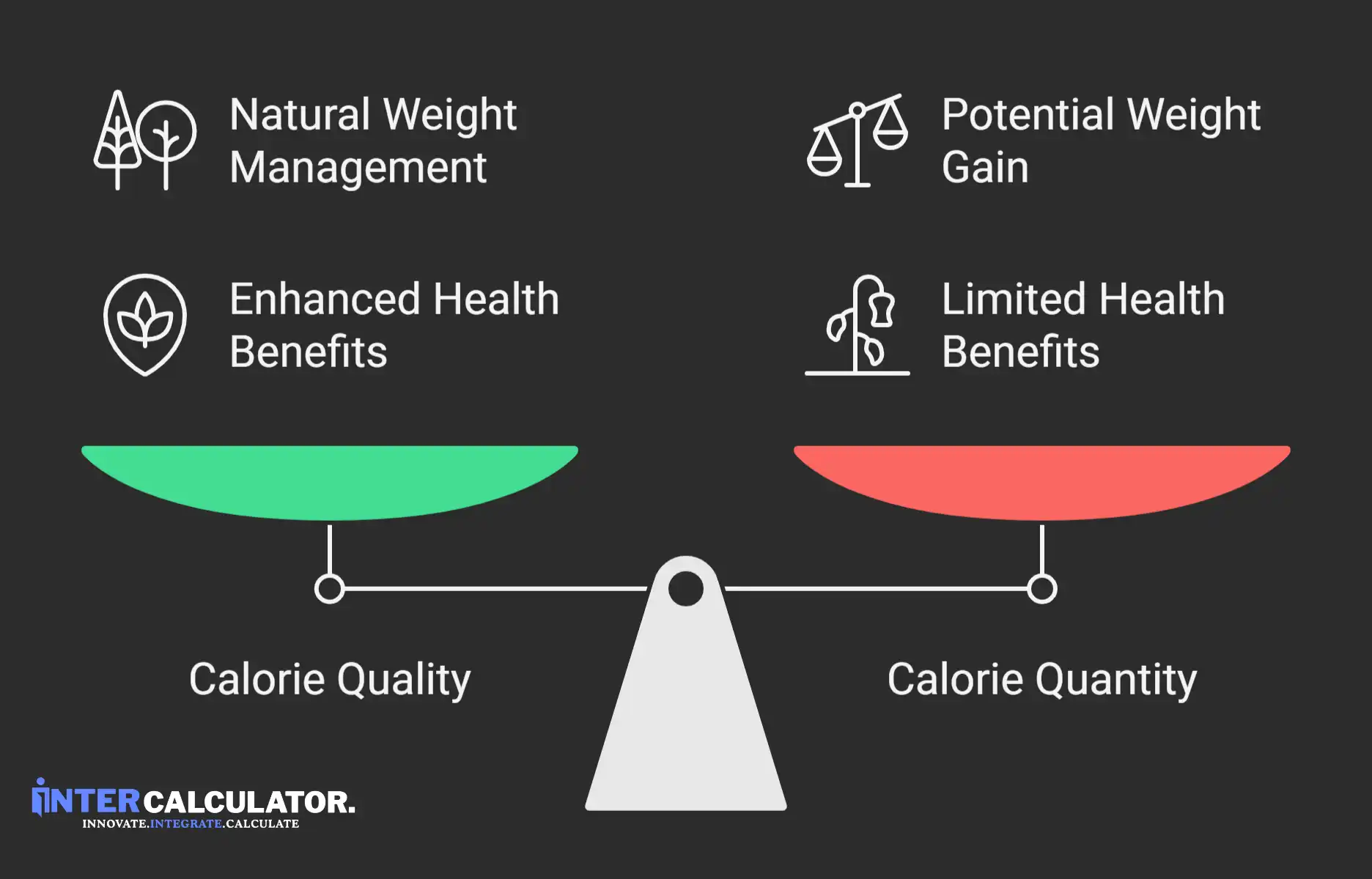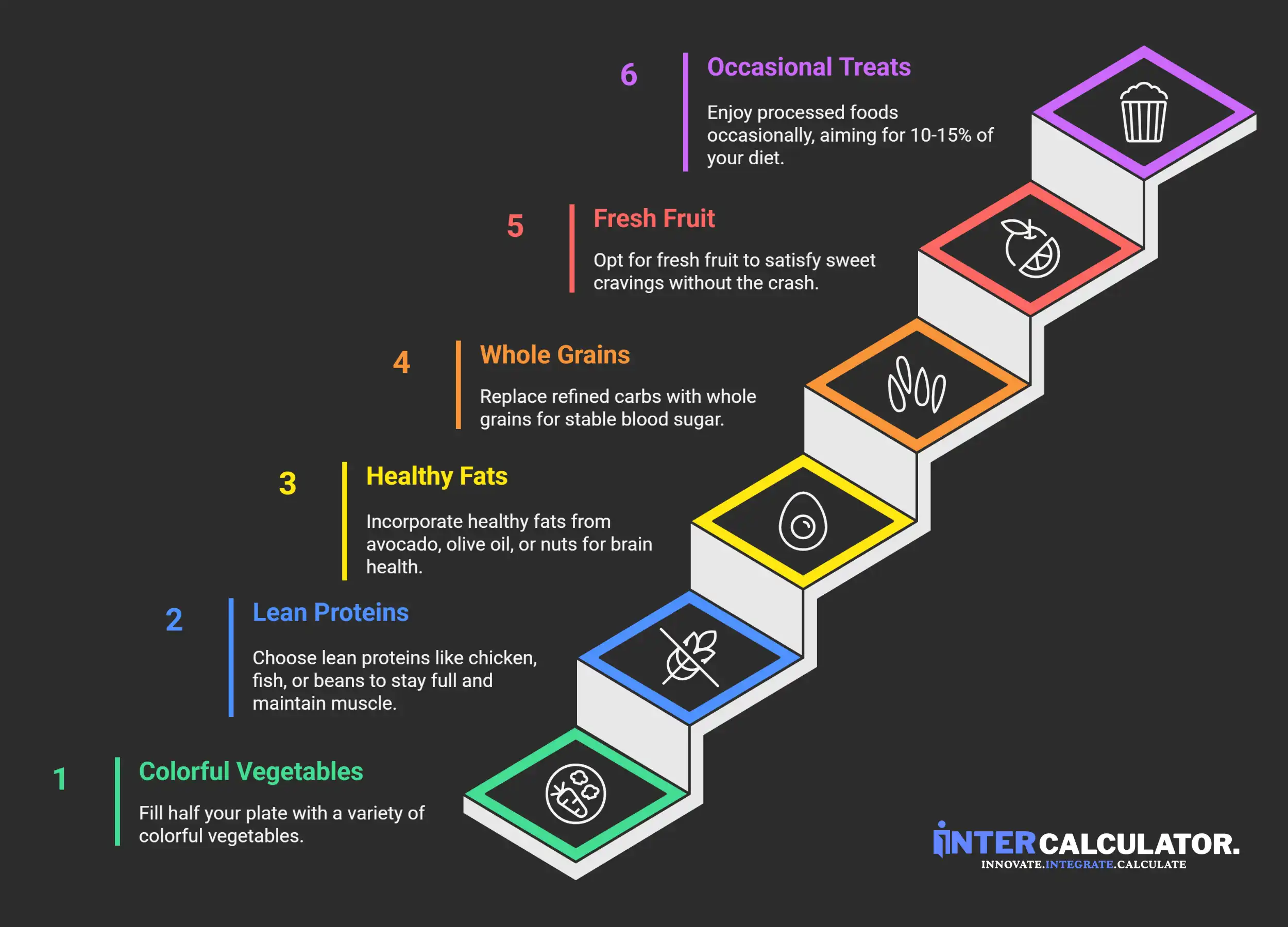You’re standing in the grocery store, staring at two protein bars. One has 200 calories but reads like a chemistry experiment. The other has 250 calories with ingredients you can actually pronounce. Which one helps you lose weight? Honestly, I’ve been there too many times, and the answer reveals the truth about calories that most diet books never explain.
In this blog, I’ll show you why the traditional “calories in, calories out” idea doesn’t tell the full story, how your body actually processes food, why quality matters more than quantity, what science reveals about metabolism and hunger, and how a few simple changes to your eating habits can make weight management easier without obsessing over every calorie.
Why the “Calorie In, Calorie Out” Model Is Outdated
Back in 1918, a woman named Lulu Hunt Peters wrote the first best-selling weight loss book called “Diet and Health: With Key to the Calories.” She introduced the world to calorie counting, and we’ve been stuck with that advice ever since.
The idea seems simple enough. The energy balance equation says that if you eat fewer calories than you burn, you’ll lose weight. If you eat more, you’ll gain weight. It’s basically math, right?
Well, not really.
This conventional wisdom is what I call “technically true but practically useless.” Yes, energy in and energy out matter. But treating all calories the same is like saying all cars get the same gas mileage because they all burn fuel. A truck hauling cargo uphill burns way more than a sedan cruising flat roads.
Your body doesn’t just count calories. It processes them. And how it does that depends on what you’re eating, your gut microbiome, your metabolism, your hormones, and about a hundred other things science is still figuring out.
The funny part? We’ve been told to eat less and move more for decades. Yet obesity rates keep climbing. If calorie restriction were the answer, wouldn’t we all be thin by now?
How Your Body Actually Processes Calories
Let me break down what’s really happening inside you when you eat. It’s not as simple as fuel going into a tank.
The Role of Your Gut Microbiome
Your gut houses trillions of tiny organisms that basically run the show when it comes to weight management. These little guys decide how many calories your body actually absorbs from food.
Here’s the wild part: naturally thin people have different gut bacteria than overweight people. Scientists even did experiments where they transplanted the gut microbiome from thin mice into obese mice, and the obese mice started losing weight.
I’m not saying you need a gut transplant. But it shows that calorie absorption isn’t the same for everyone, even when eating identical meals.
Your Metabolic Set Point
Your brain has a region called the hypothalamus that acts like a thermostat for your body weight. It tries to keep you at a certain “set point” based on your genes, environment, and behaviors.
This is why 96% of people who lose a lot of weight end up gaining it back. Your body literally fights you.
Remember that show, The Biggest Loser? Researchers studied the contestants and found something depressing. After their dramatic weight loss, their resting metabolic rate crashed. Their bodies burned way fewer calories just to keep the lights on.
It’s called metabolic adaptation, and it’s your body‘s survival mechanism. When you cut calories, it responds by making you hungrier and more tired. You can fight it with willpower for a while, but your body usually wins.
Food Type Matters More Than You Think
In 2019, researchers at the U.S. National Institutes of Health published a controlled study in Cell Metabolism that compared two diets containing the same number of available calories, sugar, fat, fiber, and other nutrients, one made up of ultra-processed foods and the other of unprocessed, whole foods.
Participants lived in a research facility for four weeks and could eat as much or as little as they wanted. When they were on the ultra-processed diet, they consumed about 500 more calories per day on average and gained roughly one kilogram over two weeks. When switched to the unprocessed diet, the same people ate fewer calories and lost a similar amount of weight, even though the meals were nutritionally matched.
The authors concluded that ultra-processed foods may promote overeating and weight gain compared to minimally processed foods, possibly due to differences in eating speed, texture, or satiety signals. However, the study did not directly measure “brain satisfaction” or evolutionary effects, it simply showed that people tended to eat more when their food was ultra-processed.
The Case for Calorie Quality Over Quantity
I used to think I could eat whatever I wanted as long as I stayed under my calorie budget. Spoiler: it didn’t work.
What Makes Food “High Quality”?
High-quality foods are nutrient-dense and minimally processed. Think vegetables, fruits, whole grains, lean proteins, healthy fats, legumes, nuts, and seeds.
These foods are packed with fiber, protein, vitamins, minerals, and all sorts of good stuff your body needs.
Low-quality foods are the opposite: refined grains, added sugar, fried foods, saturated fat, and anything that comes in a crinkly bag with ingredients you can’t pronounce.
The difference isn’t just nutritional. It’s how these foods talk to your body. If you’re curious where you stand right now, you can check your BMI (Body Mass Index) with our free BMI calculator to get a simple snapshot of your current weight category before focusing on long-term nutrition quality.
How Quality Foods Change Your Weight Naturally
Here’s what happens when you eat nutrient-dense whole foods: they send the right signals to your body systems.
- The fiber and protein slow down digestion, keeping your blood sugar stable. No crazy spikes, no crashes, no desperate 3 PM candy bar runs.
- You feel full and satisfied on fewer calories because your body is actually getting what it needs. When you’re well-nourished, your hunger signals calm down.
- Your fat cells even get the message that it’s safe to release stored energy. You create a natural calorie deficit without white-knuckling through constant hunger.
A massive Harvard study followed 120,000 people for 20 years. The researchers found that potato chips, potatoes, sugar-sweetened beverages, and red meats were linked to weight gain. Meanwhile, vegetables, whole grains, fruits, nuts, and yogurt were linked to weight loss.
To be fair, this isn’t about willpower. It’s about working with your body instead of against it.
I switched from low-fat everything to whole foods a few years back. I stopped counting calories obsessively. The weight came off easier than when I was eating 100-calorie snack packs and feeling miserable.
But Do Calories Still Matter?
Short answer: yes. But probably not in the way you think.
The energy balance equation is still true. You can’t break the laws of thermodynamics. If you consistently eat more energy than you use, you’ll store it as fat. If you eat less, you’ll lose weight.
But here’s the thing: when you focus on quality, quantity takes care of itself. Still, if you’re curious about your progress beyond the scale, you can use our Body Fat Calculator to see how your muscle and fat levels are changing over time.
The DietFits study at Stanford University proved this beautifully. Researchers put 609 people on either a healthy low-fat diet or a healthy low-carb diet for a year.
Both groups were told to eat minimally processed whole foods, cut back on white flour and sugar, and eat as many vegetables as possible. But nobody was told to count calories or restrict portions.
After a year, both groups had lost about 12 pounds. They’d each naturally reduced their intake by 500 calories per day without even trying.
The difference between this and traditional calorie counting? People felt satisfied instead of deprived. They weren’t hungry all the time. They didn’t feel like they were on a diet.
Can you still overeat healthy foods? Sure. Try eating 3,000 calories of broccoli in one sitting. I’ll wait.
It’s way harder to overeat whole foods than cookies. That’s the whole point.
And yes, 1,500 calories of junk won’t give you the same results as 1,500 calories of nutritious food. Your body processes them differently, and you’ll feel completely different throughout the day.
The Problems With Strict Calorie Counting
I spent years logging every single bite in tracking apps, and honestly, it drove me crazy.
First, nutrition labels aren’t exact. They can legally be off by up to 20%. So that “200-calorie” protein bar you eat might actually have 160 or even 240 calories.
Second, you can’t really know how many calories you’re burning. The treadmill display and fitness trackers are just estimates based on averages, not your unique body. If you want to get a more realistic idea, you can use our Treadmill Calorie Calculator to estimate your burn based on your actual speed, incline, and weight.
Third, when you eat less, your body fights back. It slows down your metabolism to save energy and increases hunger hormones like ghrelin.
In the end, you find yourself in a tiring fight with your own body.
And then there’s the deprivation mindset. When you keep thinking, “I only have 300 calories left today,” every meal turns into a source of stress. You stop listening to your body and start eating by numbers instead of by hunger or satisfaction.
Calorie counting also ignores your actual nutritional needs. You could hit your calorie target eating candy and still be deficient in vitamins, minerals, and phytochemicals your body needs to function.
If you’re not eating enough protein, you’ll lose muscle mass along with fat. That’s not weight loss, that’s just getting weaker.
Most people give up within a few months and regain all the weight. I’ve seen it happen to friends. I’ve done it myself.
The quality-first approach addresses the root problem: nutritional imbalance and unsatisfied hunger. Fix those, and the calories take care of themselves.
Practical Steps: Focus on Quality First
You don’t need to be perfect. I’m not. Just shift the balance toward better choices.
-
Fill half your plate with colorful vegetables.
The more colors, the better. Broccoli, spinach, bell peppers, carrots, whatever you like. -
Choose lean proteins like chicken, fish, eggs, beans, and lentils.
These keep you full and help maintain muscle. -
Add healthy fats from avocado, olive oil, nuts, and seeds.
Your brain needs fat to work properly, and these help you absorb vitamins. -
Replace refined carbs with whole grains.
Swap white rice for brown rice. Try quinoa or steel-cut oats. These have fiber that keeps your blood sugar stable. -
When you want something sweet, reach for fresh fruit first.
Berries, apples, and oranges satisfy sweet cravings without the crash.
These small adjustments become habits faster than you think. Within a few weeks, your taste buds actually change. I used to think whole-grain bread was boring. Now regular white bread tastes like sugary mush to me.
You can still enjoy processed foods occasionally. I do. Aim for about 10-15% of your diet. Have the pizza at the party. Eat the birthday cake. Just make sure most of your meals are real food.
When You Might Need to Track Calories
To be fair, there are times when tracking helps.
- If your weight loss stops even when you eat healthy foods, tracking can show what’s going on. Maybe you eat more nuts than you think, or your portions have slowly gotten bigger.
- Athletes with specific performance goals often need precise intake. If you’re training for a marathon or trying to build significant muscle, knowing your numbers matters.
- Some medical conditions require careful monitoring. If your doctor tells you to track, listen to them.
- The last 10-15 pounds can be stubborn. When you’re already at a healthy weight and want to get leaner, small adjustments matter more.
- The key difference: use tracking as data, not restriction. It’s information to help you make better choices, not a daily punishment.
And honestly? If you need help figuring this out, talk to a registered dietitian or your doctor. They can give you personalized advice based on your actual situation.
The Bottom Line: Quality and Quantity Work Together
Here’s what I’ve learned after years of trying different diets: the quality of your food makes it easier to control the quantity. Both are important, but when you focus on giving your body real, whole foods, you naturally eat less without feeling hungry or deprived. This creates steady, lasting weight loss instead of the constant lose-gain-lose cycle that most diets cause. The benefits go far beyond the number on the scale, too: better energy, a stable mood, clearer thinking, better sleep, and a lower risk of disease.
Stop worrying so much about numbers and start focusing on nourishment. When you feed your body what it truly needs, real food full of nutrients, managing your weight becomes easier. Your hunger balances itself, your energy stays steady, and you stop fighting against your own body.
Work with your body, not against it. That’s the real secret to long-term health and keeping a healthy weight that actually lasts. If you’d like to know what weight range aligns with a healthy BMI for you, try our Reverse BMI Calculator to find your ideal target weight safely.
FAQs
What is the 3-3-3 rule for weight loss?
The 3-3-3 rule is a simple way to build healthy habits. It means drinking 3 liters of water each day, doing 30 minutes of exercise, and getting at least 7–8 hours of sleep for 3 weeks straight. It’s not a magic diet, but it helps create consistency and discipline, two key things for weight loss.
Does the quality of calories make a difference?
Yes, it does! Not all calories are the same. 200 calories of chips don’t affect your body the same way as 200 calories of vegetables or chicken. High-quality foods like fruits, veggies, and proteins keep you full longer and give your body real nutrients.
How many calories are in 4 eggs?
Four large eggs have around 280 to 320 calories, depending on how you cook them. Boiled or poached eggs have fewer calories, while fried eggs may have more because of the added oil or butter.
Does protein count as calories?
Yes, protein counts as calories. Every gram of protein has about 4 calories. The same goes for carbohydrates. Fat, on the other hand, has about 9 calories per gram.
What are common calorie counting mistakes?
Here are some common mistakes people make when counting calories:
-
Forgetting to count snacks, sauces, or drinks.
-
Guessing portion sizes instead of measuring.
-
Trusting fitness tracker numbers too much.
-
Not adjusting calorie goals as weight changes.
-
Ignoring food quality and focusing only on numbers.


